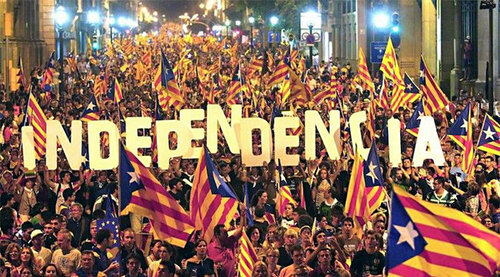The forthcoming general elections set to take place in Spain on 20 December will not only sum up the political outcome of 2015 in the country, but will also possibly set the direction for Europe’s development in 2016. And it is already clear that one of these directions is the spread of separatist sentiment in the Old World.
Too many things are already undermining the European political system: the instability in the Middle East triggered by US policy; the international terrorist groups slipping out of the control of the Western architects of a ‘new world order’; the influx of refugees entering Europe; the resulting rise in nationalist and isolationist tendencies; and, finally, the stubborn refusal of Washington and Brussels to cooperate with Russia on the most pressing issues on the international agenda… At present, it is hardly possible to confidently predict what state the EU will be in by 2017.
In terms of 2015, however, the year is drawing to a close to the accompaniment of statements and actions by those in favour of Catalonia’s secession from Spain. The resolution passed by the Catalan Parliament on 9 November declaring the start of Catalonia’s secession from Spain set a match to the wick of yet another European powder keg. Spanish Prime Minister Mariano Rajoy quickly appealed to the Constitutional Court of Spain to prevent the resolution being implemented. On Wednesday 2 December, the Constitutional Court unanimously voted in favour of annulling the resolution of the Catalan Parliament «to begin the secession process from Spain», ruling that it «violates constitutional norms». Meanwhile, «the number of people demanding Catalonia’s independence continues to grow», according to the Catalan party Junts pel Si (‘Together for Yes’), which achieved success in the local elections held on 27 September.

The position of Spain’s central authorities can be understood on the strength of economic considerations. If Catalonia does secede, then Spain’s GDP will fall by roughly 20 per cent, while its debt to GDP ratio will increase by 25 per cent. There may also be political costs for the ruling People’s Party, which is at risk of finding itself between a rock and a hard place in the forthcoming elections – between those who sympathise with the Catalans in their struggle for independence and those who are in favour of the central authorities introducing more stringent measures.
The escalating Catalan issue will inevitably have an effect on similar conflicts in other European countries with similar problems – from Scotland and Belgium to Ukraine and the Balkans. In the Balkans in particular, the issue of preserving a unified Bosnia and Herzegovina could be raised again, and this time decisively. There is good reason why both those in favour and those against the secession of Catalonia often refer to the Balkan, and especially the Kosovo, experience. And while the supporters of Catalan separatists recall the Kosovo precedent as a positive factor, opponents stress the problems faced by Europe as a result of the indulgence of Albanian separatists in Kosovo.
In this regard, a revealing article appeared in the leading Spanish newspaper El Pais in November. It contains the kind of views that do not often reach European readers. «Kosovo is an enormous failure, and a triple one at that», writes El Pais. «It is the failure of the international community, which, before coming to an agreement on the main issue, i.e. the future of the Kosovo population, got too carried away playing games with geopolitics and sovereignty. It is the failure of the Serbs, who, forgetting about a past marked by civil wars and international conflicts, believed the opportunists and the criminals who promised them a Greater Serbia, but who instead left them with a country stranded on the margins of Europe and robbed of part of its own territory. And it is the failure of the Kosovo Albanian leaders who used independence to establish a system of government based on cronyism, corruption and organised crime, and who squandered billions of dollars given to them as aid by the international community».
Setting aside the biased nature of the stereotypical assessment of Serbia’s former leaders as «opportunists and criminals» that is completely in the spirit of the Western mainstream media, the rest of El Pais’ judgement, which rightly points out that up to 40 per cent of the population of the Kosovo pseudo-state intends to leave the country as soon as possible, sounds rational and balanced. The Spanish newspaper is seriously critical of the «international community»: «If Kosovo teaches us anything, it is that unilateral secession ends badly. In the absence of an international legal framework and without the explicit support of the international community, many will have an interest in seeing independence fail. This is exactly what happened in Kosovo, the independence of which has never been recognised by a number of countries including Spain, China, Russia, Greece and Slovakia. They all see the Kosovo issue as being of fundamental importance to themselves. In 2008, ten years after the war began in Yugoslavia, Kosovo declared independence. Today, despite the fact that it is recognised by 111 countries, Kosovo is not only not a member of the UN, it hasn’t even been able to join UNESCO… I wish someone would explain all this to the Kosovo authorities».
There is no point in trying to explain anything to the Kosovo authorities, who are aware of their interests and are confident in the support from the US. However, the dramatic situation in Europe today requires careful and informed decision-making from everyone. This also relates directly to those Balkan countries that are balancing between the East and West, Brussels and Moscow. The political configuration of Europe will experience major changes in the near future, and they will be changes that everyone needs to be ready for.









